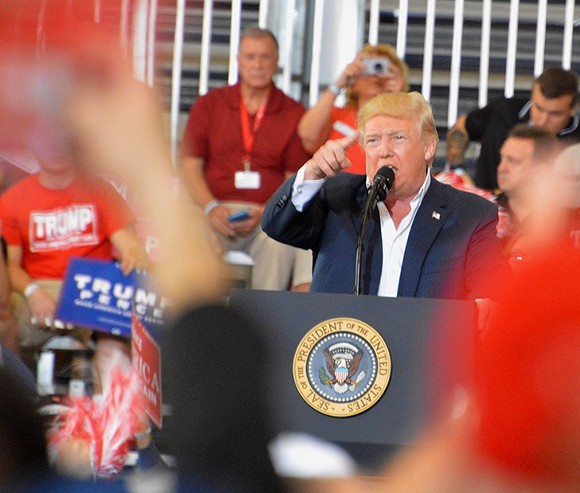The train has almost entirely derailed.
Over the last two weeks, the failures and scandal of the first seven months of the Trump administration have become manifest and undeniable, focused like a laser for all the world to see: the failure to advance even the slightest health care reform, despite Republicans controlling both houses of Congress and the White House; the hiring of loudmouthed hedge-fund jackass Anthony Scaramucci as communications director and the subsequent resignation of press secretary Sean Spicer and firing of chief of staff Reince Priebus, followed by the firing of Scaramucci by new chief of staff John Kelly; the leaking of embarrassing transcripts of phone calls between Trump and world leaders, in which the president begged the Mexican president not to tell the media he wouldn't pay for the wall and behaved like a petulant preteen while talking to the Australian prime minister; Republicans increasingly starting to distance themselves from the White House, including Arizona Sen. Jeff Flake, who wrote that his party has "maintained an unnerving silence as instability has ensued"; and the president's rock-bottom approval ratings, despite a reasonably good economy and an unemployment rate of 4.3 percent.
Perhaps most alarming for the administration, last week brought news that special counsel Robert Mueller has convened a grand jury in Washington, D.C., to investigate the Trump campaign's possible collusion with Russia during the 2016 election. Subpoenas have reportedly gone out related to former national security adviser Michael Flynn's business as well as the meeting between Donald Trump Jr., Jared Kushner, and then-campaign manager Paul Manafort and a Russian lawyer promising dirt from the Kremlin on Hillary Clinton. A grand jury was inevitable and a logical next step. But there's nonetheless an unavoidable sense that the noose is ever-so-slightly tightening around Team Trump.
The president, meanwhile, is reduced to holding rallies in friendly territory to prop up his fragile ego. It's not a good look.
Congress is now in recess for the summer, having left town without delivering any major legislative victories for the new president. When it returns, GOP leaders are promising to tackle an overhaul of the tax system, a task no less complicated or daunting than health care. Soon, the midterm election season will be upon us, and members of Congress will be much more interested in self-preservation than in passing controversial legislation at the behest of an unpopular president.
In other words, if you thought that first seven months were bad, just wait; it's not going to get any easier. And if Democrats retake the House in 2018 – if the current polling holds up, that seems possible, if not likely – the White House can expect to be mired in two years of investigations into its relationship with Russia and God knows what else, as well as a possible impeachment (though a conviction in the Senate seems like a stretch), all leading into the 2020 election.
All of which is to say, Trump's window for effecting big, lasting change is closing – and the progressive resistance, those who took to the streets and besieged senators with angry phone calls, succeeded. They couldn't stop everything, not Trump's executive orders or the EPA from utterly shirking its job. But all that can be easily fixed with the next president. The real damage – cutting Medicaid, repealing the Affordable Care Act – that stuff is stillborn, and that's a victory for the good guys.
The question is whether they can keep it up – whether progressives can keep their feet on the administration's throat, whether they can muster the continuing energy to turn anger and action in the first half of 2017 into progress over next 15 months, whether they can recruit and fund and propel a next generation of progressives into elected office.
That I'm not so sure of.
The reality is, many voters react to what's called negative partisanship. Their voting against Trump may be enough for Democrats to succeed. That's how Republicans gained power, by being against Obama and then against Clinton, not on the strength of their own (more or less absent) agenda. But you also need to inspire your own partisans – and if you win, staying in power and getting things done requires having a proactive agenda and inculcating a new crop of leaders. On both counts, the Democrats seem stagnant.
The recently unveiled "Better Deal" agenda marks a turn toward economic populism (anti-trust regulations, $1 trillion for infrastructure, $15/hour minimum wage, tax credits for apprenticeships and job training), a naked appeal to the suburban and Rust Belt whites who abandoned the Dems for Trump because they were "economically anxious" – and certainly not because Trump was peddling his own nativist and racist version of populism. It's also a recycling of incremental-minded Democratic policy ideas from the last 20 years – hardly exciting stuff.
And then there's the question of who's going to be selling it. There are plenty of senators who will take a crack at the White House next time around, especially given how unpopular Trump is. Some of them might prove to be good candidates. But the bigger problem is at the state level, where in most states – as is the case in Florida – Democrats have an extraordinarily weak bench and Republicans control the levers of power.
That's where the movement needs to focus its efforts as Trump flails, on ensuring that after the inevitable collapse, progressives have the infrastructure and ideas in place to pick up the pieces and move forward.
As the saying goes, you don't beat something with nothing.


